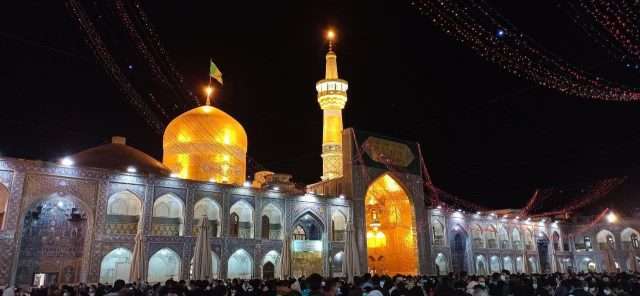Opportunities for the tourism industry between Iran and Pakistan

Geopolitical Report ISSN 2785-2598 Volume 20 Issue 4
Author: Abed Akbari
The neighbouring Iran and Pakistan might expand their cooperation in the tourism industry to create job opportunities and support regional development in a period characterised by huge geopolitical risk in Eurasia.
At the end of May 2022 at the World Economic Forum (WEF) in Geneve, Switzerland, Iranian Foreign Minister Hossein Amir Abdollahian and his Pakistani counterpart Bilawal Bhutto Zardari discussed close political consultations between the two countries on Afghanistan, developments on the subcontinent, and other regional and international issues. The two parties discussed the necessity to increase trade and economic cooperation in different sectors, including recreational and pilgrimage tourism, energy, transportation, and transit.[1]
Regarding the tourism sector, last week there was a meeting between a delegation led by Iran’s Deputy Minister of Islamic Culture and Relations, Dr Hussain Rozba, and Vice Minister for Culture of Iran, Arab Asadi, and the Pakistani Minister for Religious Affairs and Interfaith Harmony, Mufti Abdul Shakoor. Since Iran is a famous religious destination for many Muslim believers who want to visit sacred religious figures in the country, the Islamabad side suggested once again Tehran to finalise the draft of the proposed Ziarat Policy to give a boost to religious tourism in both countries.[2]
Bilateral relations bring nations closer together. Governments, particularly in neighbouring countries, must facilitate communications in various sectors, such as cultural, economic, scientific, and healthcare. At this critical juncture, when the world is undergoing decisive changes in terms of health and security, giving more profound attention to expanding the tourism industry, especially in the context of the neighbourhood policy, matters more than ever before.
Such an essential competitive industry must be discussed not only in the context of job creation for a large number of the people reciprocally, as in transport, travel, and hospitality, but also in the context of the geostrategic position of Iran and Pakistan, which makes it essential for both countries to expand their relations. Bilateral efforts to promote tourism are one crucial variable in developing diplomacy between the two countries. When the region is going through troubled waters due to the instability caused by failed states, expanding diplomacy between these two stable countries can be the cornerstone of improving national and regional peace.
With the emergence of growing environmental crises, expanding tourism between Iran and Pakistan can help both governments improve their respective countries’ economic situation without further exploiting their natural resources and exporting raw materials.[3] Likewise, in religious affairs, the two Muslim neighbours can have confidence in the cooperation between their governments, people, and the private sector for booming tourism. Of course, expanding this industry between Tehran and Islamabad also faces challenges for which solutions must be found. The most important of these is the safety of Iranian tourists in Pakistan which can take away from the allures of this destination.
Iran – Pakistan’s possible cooperation in tourism
Iranian tourists have limited knowledge of the 2500 years of history in Pakistan, a country rated in the higher echelons of global tourism, hosting a large number of visitors, especially from Europe.[4] The ancient ruins of the Himalayan Hills, diverse ecosystems, and pristine natural landscapes, especially in northern Pakistan, known as the country’s tourism capital, are known to “AnIranians”. But as mentioned previously, regional unrest and acts of terrorism have overshadowed the development and prosperity of Pakistan tourism.[5] Nevertheless, in competing with other tourist destinations worldwide, this country has taken adequate measures to promote the industry by facilitating visas for certain countries.
Hence, the policy of expanding tourism between Iran and Pakistan must be based on strengthening their resources and the will to attain new achievements. Despite being sanctioned, Iran has made great efforts to create the essential infrastructure for absorbing tourists from Pakistan – an important issue which must be strengthened. Equally, Pakistan should be able to introduce itself as a destination for tourism and investment to the Iranian audience. Iran has taken great strides in welcoming large numbers of Pakistani pilgrims and tourists by creating the required infrastructures for their health and welfare. Currently, the city of Mashhad in northeastern Iran is a ‘safe haven’ for pilgrimage, tourism, and healthcare.
Tehran’s authorities should work to facilitate health tourism in eastern Iran. This can be achieved by admitting more patients into hospitals in Mashhad and attracting Pakistani investors, primarily through the Mirjaveh-Taftan border crossing. Iran and Pakistan can be the gateway crossing from East to West, a plan that can double economic importance in the China Belt and Road Initiative (BRI). Association between Iran and Pakistan to become one group, hub, or economic gateway, has passed the test in the Arbaeen religious ceremony, an event which not only displays the cultural and religious norms shared by both countries but also takes on economic importance in terms of the dynamics of attracting tourists to the both destinations.
Based on a new dialogue on regional peace, Iran and Pakistan can develop relations and cooperate in a fiercely competitive global setting to attract tourists based on their common historical, cultural, and religious attractions.
Sources
[1] Government of the Islamic Republic of Iran (2022) Iran, Pakistan review close political consultations on regional, int’l issues. Link: https://irangov.ir/detail/387757.
[2] The Express Tribune (2022) Iran urged to finalise ‘Ziarat Policy’ to boost religious tourism. Link: https://tribune.com.pk/story/2358782/iran-urged-to-finalise-ziarat-policy-to-boost-religious-tourism.
[3] Abed Akbari (2022) Iran-Pakistan Relations: Changing from Tactical to Strategic Ties, Geopolitical Report ISSN 2785-2598, Vol. 15(8), SpecialEurasia. Link: https://www.specialeurasia.com/2022/01/24/iran-pakistan-strategy-relations/.
[4] The Nation (2022) Takht-I-Bahi World Heritage Site Attracts European Tourists. Link: https://nation.com.pk/2022/05/31/takht-i-bahi-world-heritage-site-attracts-european-tourists/.
[5] Riccardo Valle (2022) Islamic State Khurasan increase its attacks against members of Jamiat Ulema-e-Islam in Pakistan, SpecialEurasia. Link: https://www.specialeurasia.com/2022/04/19/iskp-jamiat-ulema-e-islam/; Giuliano Bifolchi (2022) The terrorist attack in Pakistan highlights regional instability, SpecialEurasia. Link: https://www.specialeurasia.com/2022/03/06/terrorism-pakistan-security/.
Disclaimer. The views and opinions expressed in this article are those of the author and do not necessarily reflect the official policy or position of SpecialEurasia.
